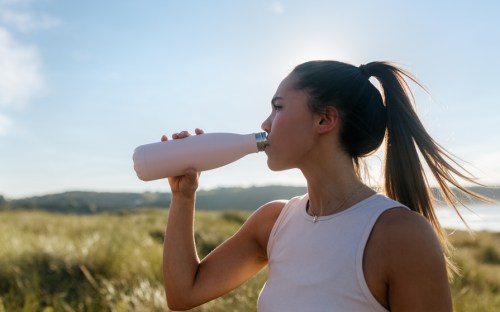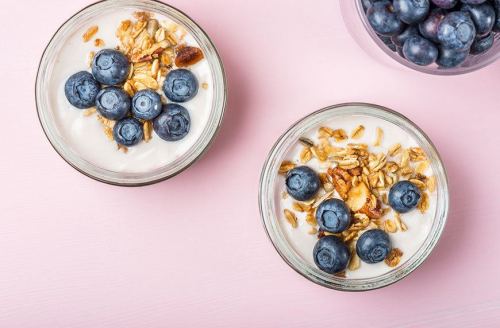POV: You went out last night, and now you’re exerting every last ounce of effort clawing your way to the Pedialyte (or Liquid I.V. packet) on your nightstand. Of course, it’s just out of arm’s reach, and your severe dehydration makes you feel like this is a cruel joke. After finally getting ahold of your drink and glugging it down, you feel like a weight has lifted and you can finally (almost) move again.
Experts in This Article
the chief scientific officer at GoHydrate
Oran Mehrnia is a doctor of osteopathic medicine.
Of course, this can also happen not only after a long night out. Your body can crave fluids and electrolytes after a rigorous sweat sesh, too much time outside on a blisteringly hot summer day, or when you’re under the weather (or, really, for no particular reason at all). However, if you’ve ever wondered how to decipher whether you’re simply parched or something more—namely, an electrolyte imbalance—is at play, you’ve come to the right place.
We spoke with a doctor to get the full scoop on the under-the-radar ways your body is telling you that you’re not getting enough electrolytes, which can easily be mistaken as just pure dehydration. Spoiler alert: The two often go hand in hand. He helped define the key differences between the two, how much electrolytes you should consume daily, and the best way to do so—all essential intel for staying appropriately hydrated, especially as you age.
What’s the difference between dehydration and an electrolyte imbalance?
Although dehydration and an electrolyte imbalance share several similar characteristics (making it exceptionally easy to conflate or confuse the two), there are a few key markers to help you decipher which one you’re dealing with. For starters, electrolytes are minerals in your body that have an electric charge, which help balance the amount of water in your body, balance pH levels, manage cell health, and regulate multiple bodily systems. Meanwhile, dehydration is a condition caused by losing too much fluid from the body.
According to Oran Mehrnia, DO, dehydration and an electrolyte imbalance can present similar symptoms but have a few specific characteristics that set them apart. “A major difference to differentiate the two would be that dehydration is a problem purely to do with too little water in the absence of an imbalance of electrolytes,” Dr. Mehrnia says. “That being said, this is rare, as electrolytes largely flow with water, and severe dehydration almost always causes electrolyte derangement.” In other words, dehydration and electrolyte imbalance go hand in hand.
However, Dr. Mehrnia notes that even though electrolyte disorders are often caused by dehydration, they can also occur in states of too much water. So, how can you tell if an electrolyte imbalance is the real culprit, you may ask? He recommends closely examining your symptoms and levels of specific minerals to make the correct diagnosis.
What are the common signs of dehydration vs. an electrolyte imbalance?
Common signs that you’re dealing with dehydration include headaches, brain fog or confusion, fatigue, mood swings, lightheadedness, and dizziness.
“Depending on the level of dehydration, it can take up to 36 hours for symptoms to improve,” Mahmud Kara, MD, previously told Well+Good. So if you’re dealing with mild symptoms, drinking water will certainly help you stay hydrated. However, if you have moderate to severe symptoms, it’s likely that your dehydration has led to an electrolyte imbalance as well. This will require a hydrating beverage fortified with electrolyte-rich minerals.
What happens when your body is low on electrolytes?
“The signs of electrolyte imbalance include irregular heart rhythm, fatigue, malaise, altered mental status, headache, dizziness, and muscle spasms,” Dr. Mehrnia says. Meanwhile, dehydration can also include these symptoms as well as low blood pressure.
“The most common types of electrolyte imbalance include hyper- and hypo- states of minerals, including sodium, potassium, calcium, and magnesium,” Dr. Mehrnia says. These imbalances, he adds, are typically triggered by persistent vomiting or diarrhea, but they may also be linked to kidney or heart failure, taking certain medications, or changing your dietary habits.
Dr. Mehrnia recommends seeking medical attention immediately if you are experiencing these symptoms (especially if they persist despite adequate hydration after consuming some of these best electrolyte drinks). “After all, in rare instances and in certain disease states, severe imbalances can occur. Some can be fatal; for example, hyperkalemia and hypokalemia [too much or too little potassium in your bloodstream] can cause cardiac arrest through irregular heart rhythms. This is rarely due to dietary intake and almost always happens in the presence of other medical issues. As much, in the majority of healthy adults, the GI tract and kidneys naturally regulate fluid and electrolyte balance together to maintain equilibrium,” Dr. Mehrnia says.
How to replenish electrolytes
“The most efficient and cost-effective way to replenish electrolytes is with enriched fluids by mouth. Electrolytes follow water and are eventually absorbed into the blood,” Dr. Mehrnia says. He says drinks like Gatorade, Nuun, BodyArmour, Powerade, Liquid I.V., Pedialyte, and Electrolit offer adequate electrolytes to help you stay balanced and well-hydrated. (Be sure to check out the best and worst beverages for hydration here and why drinking electrolytes in the morning can help, too.)
Additionally, there are plenty of foods high in electrolytes—from leafy greens and sweet potatoes to olives, pickles, coconut water, dark chocolate, and avocados—which makes fitting a bounty of electrolytes into our meals *naturally* a breeze.
TL;DR? Before you lose any sleep over your electrolyte intake unnecessarily, keep in mind Dr. Mehrnia’s note above about how the body’s GI tract and kidneys work together to naturally regulate fluid and electrolyte balance and maintain equilibrium. He did share recommendations for daily consumption with us, but underscores the fact that these general guidelines can vary widely depending on the source and can be vastly different for specific populations (such as professional athletes).
In general, healthy adults require:
- Sodium 1-2 mEq / kg per day
- Potassium 1-2 mEq / kg per day
- Calcium 10-15 mEq / kg per day
- Magnesium 8-20 mEq / kg per day
How can I restore my electrolyte balance fast?
According to Josie L. Tenore, MD, MSc, the chief scientific officer, GoHydrate, figuring out how much electrolytes your body is in need of can vary from day to day. However, according to her, it’s important to always listen to your body and read the signs it’s trying to tell you, especially when you’re trying to restore electrolyte balance quickly. “If you’re still thirsty after drinking eight to 12 ounces of water, it’s likely electrolytes your body craves, not just water,” Dr. Tenore says. “Without a blood test, it is impossible to know which electrolyte is low, so replenishing the key electrolytes, like sodium, potassium, magnesium, calcium, and phosphorus, will ensure that you will get what you need,” she says.
While there are many electrolyte options available, Dr. Tenore recommends choosing a product that contains all five critical electrolytes and no sugar. “One of the best on the market is a product called GoHydrate, containing five of your critical electrolytes, zero added sugar, and added vitamin D. Drinking 20 to 30 ounces of this beverage before and immediately after exercise can help maintain hydration and prevent imbalances,” she says.
Can you get too much electrolytes?
On the other hand, it’s possible to overcompensate with too many electrolytes, in which case, Dr. Tenore says you may experience (but not limited to) one or more of the following five symptoms:
- 1.Dehydration: Consuming excessive amounts of electrolytes without adequate fluid intake can lead to dehydration. This can happen because electrolytes draw water into the body, and an imbalance can disrupt the normal fluid balance.
- 2.Digestive issues: Overconsumption of certain electrolytes, such as sodium, can lead to digestive problems like diarrhea or stomach cramps.
- 3.Kidney problems: Excessive intake of certain electrolytes, such as potassium, can put a strain on the kidneys and may lead to kidney dysfunction or even kidney failure in severe cases.
- 4.Abnormal heart rhythm: Electrolyte imbalances, particularly in potassium and calcium levels, can interfere with the electrical signals that regulate heart rhythm. This can potentially lead to irregular heartbeats or other cardiovascular issues.
- 5.Muscle weakness or twitching: Imbalances in electrolytes, especially potassium, and magnesium, can cause muscle weakness, cramps, spasms, or twitching.
As such, Dr. Tenore advises folks with certain medical conditions (such as kidney disease) or those taking specific medications that may put them at higher risk for experiencing electrolyte imbalances to always consult a medical professional for any concerns.
These RD-approved *most* hydrating foods are your one-way ticket to the hydration station:
Sign Up for Our Daily Newsletter
Get all the latest in wellness, trends, food, fitness, beauty, and more delivered right to your inbox.
Got it, you've been added to our email list.











